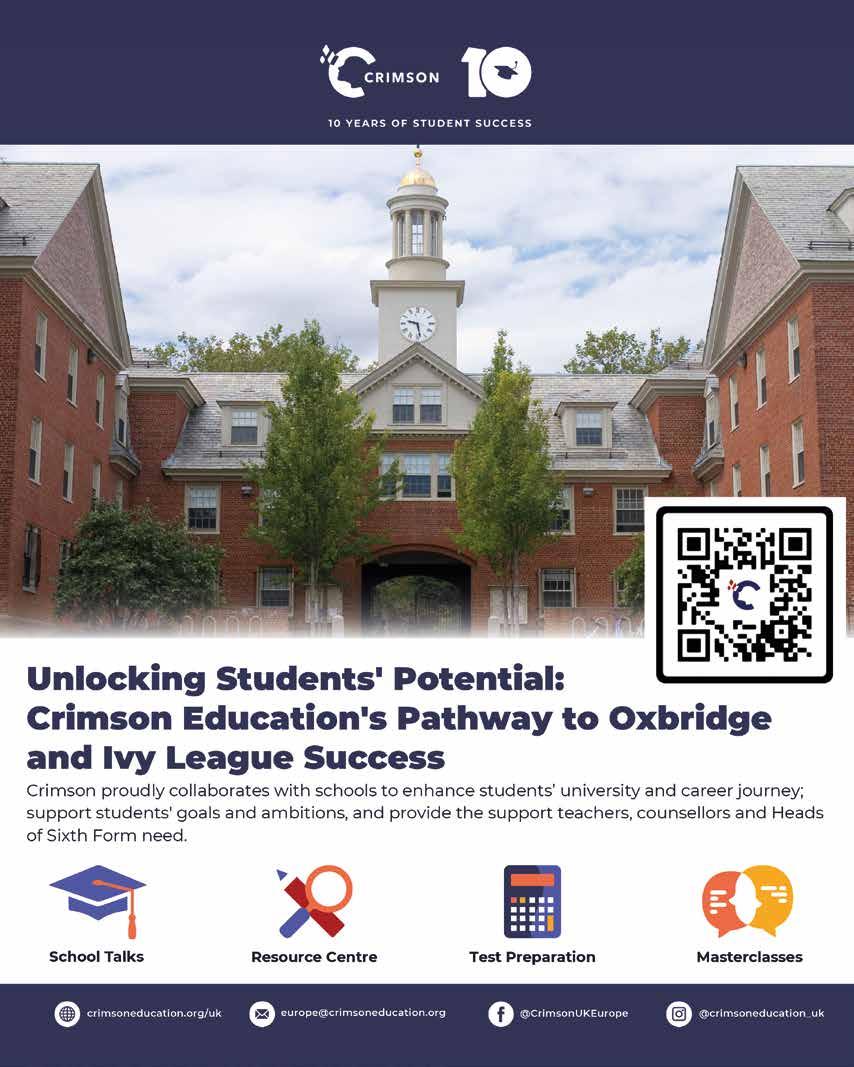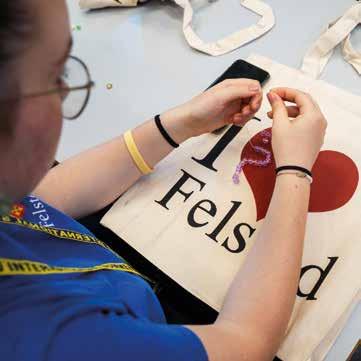
A SEAT AT THE TABLE
Seeking an open dialogue

TIPPING POINT

Are tax changes deepening the elite nature of independent schools?








Seeking an open dialogue


Are tax changes deepening the elite nature of independent schools?







What do the Government’s plans mean for our schools?




































INDEPENDENT SCHOOL
Incorporating Conference & Common Room
William Clarence Education Green Park House, 15 Stratton Street, Mayfair, London W1J 8LQ
Tel: +44 (0)207 412 8988 williamclarence.com
EDITOR
David Moncrieff
david@williamclarence.com
EDITORIAL ADVISORY BOARD
Dr Helen Wright
Educational consultant, former Head of St Mary’s Calne and President of the Girls’ Schools Association
Tory Gillingham
AMCIS CEO, former Marketing Director at Pocklington School and Marketing and Development Director at St Peter’s School, York
Andrew Lewer
MP for Northampton South 2017-24; former Chair All-Party Parliamentary Group for Independent Education
Ian Hunt
School board member in the UK and Middle East, leader of international educational projects and a contributor to the national press
Richard Harman
CEO of AGBIS. previously Headmaster of Aldenham and subsequently Uppingham. Past Chairman of the BSA and HMC
Louise Bennett
CEO of IDPE (the Institute of Development Professionals in Education)
David Walker Director, BSA
Nick Gallop
Headmaster, Brighton College International School, Bangkok; regular contributor to the TES and editor of Politics Review
Donna Stevens
CEO of the Girls’ School Association
Mark Taylor Bursar, King’s School Canterbury; previously Chairman, ISBA
Ben Vessey
Headmaster, Canford School
DESIGN & PRINT
Fellows Media Ltd
The Gallery, Southam Lane, Cheltenham GL52 3PB 01242 259241 | hello@fellowsmedia.com
ADVERTISING
Fellows Media
hello@fellowsmedia.com | 01242 259241
PUBLISHER
William Clarence Education Ltd
The William Clarence Education Group is a leading education publisher and provider of admissions, recruitment and careers solutions for parents, leaders and schools across the world.
DISTRIBUTION
Print and digital copies of Independent School Management Plus are distributed to headteachers, principals, bursars, marketing, development and admissions leads in every independent school in the UK, plus British international schools overseas. The magazine is published four times a year.
2025 looks certain to be another challenging year for the independent school sector, with the imposition of VAT on fees beginning to bite and other changes mooted by the Government likely to compound an already difficult operating environment. In his article, Tipping Point (p48), Andrew Lewer expresses his concern at this situation. He is alarmed at the potential impact on social mobility as a goal within the sector and highlights the risk that independent schools – through no fault of their own – could become more exclusive.
As significant employers, school leaders have much to consider. The increases in employers’ National Insurance and the living wage will put further pressure on finances, whilst the proposed new employment legislation is going to present potentially delicate staff management issues which will need to be resolved. In her article Workers’ Rights (p21), Louise Brenlund urges schools to consider the implications and start planning now.

There is uncertainty across the sector about what may happen next.
There is uncertainty across the sector about what may happen next and clear disagreement about how the situation should be handled, with some colleagues wishing to pursue legal action and others urging a more constructive approach towards government. In her article, A Seat at the Table (p18) , Alex Hutchinson presents a persuasive case for open dialogue, echoing Julie Robinson’s call in our last edition for ministers to work with us.
Yet, as Robin Fletcher observes (In Conversation With, p14), most challenges also present opportunities and this may be the moment to hunt out increased efficiencies and pursue diversification, as demonstrated in Enterprising Canford (p26) Certainly, time does not stand still, as Sir Anthony Seldon underlines in AI in Education (p11)
So, let’s move forward into the new year with confidence in what we do, aligned to a willingness to engage and a determination to maximise the benefits of any new opportunities which may open up. Let’s strive and thrive together.
© William Clarence Education
No part of this magazine may be reproduced without the permission of the publisher. The information contained in Independent School Management Plus has been published in good faith and every effort has been made to ensure its accuracy. All liability for loss, disappointment, negligence or damage caused by reliance on the information contained within this publication is hereby excluded to the fullest extent permitted by law.











































an open dialogue on how best to educate girls.
mean





Our School Management Plus online platform offers a wealth of information. Keep up to date and get involved:
• latest news, regular features and opinion
• monthly newsletter and jobs to your inbox
• contribute your own ideas and opinion
• join our webinars and round-table discussions.
We are the leading opinion platform for the successful running of a modern independent school. We are always keen to hear about the issues that matter to you most, so get in touch to have your school’s voice heard. editor@schoolmanagementplus.com



























leading source of news, opinion, features and jobs for all professionals working in independent and international education.
Luke Ramsden explores how AI can help schools analyse the data they hold on their students in order to understand more about behaviour patterns and improve pastoral care.
In writing this article, I am seeking to give fellow teachers and school leaders who, like me, are not experts in computing, an understanding of what generative AI can do to enrich their understanding of their own schools and inform their strategic leadership. I am usually suspicious of articles which make large claims that this or that innovation is transformational or revolutionary, but I really think that this is an area where the claim seems to be matched by the reality.
The traditional concept of pastoral care and data
Traditionally, the pastoral side of school life has not been intensive in its use of data. This has been in stark contrast to the academic side of things where, for many decades now, schools have carried out detailed and forensic analyses of their academic data and outcomes.
This may be partly explained by the fact that many people have an uncomfortable feeling about quantifying and analysing data about safeguarding, etc in a way that might seem to be turning students into ‘numbers’ rather than individuals.
Yet even before the advent of ChatGPT and its growing number of rivals, the world of data has been slowly having more of an impact on pastoral care within a school. For a start, the proliferation of online platforms for quick and easy notification and the sharing of pastoral and safeguarding data has meant that, almost accidentally, schools are now capturing huge amounts of information about their students. For instance, my
School leaders can interrogate their school data in plain English.
own school recorded around 180,000 behaviour marks last year alone (mainly merits!), each with a time recorded, what sort of behaviour mark it was and which teacher awarded it.
In addition, as schools have faced a rapidly rising number of pastoral issues during and after the COVID-19 pandemic, it has become ever more important that they find some way of managing this rising tide of concerns, even as budgets come under greater pressure. This has been a real driver for schools to find ways of evaluating and categorising their pastoral data so that resources can be targeted effectively.
I have been writing, and talking, about the importance of using data to inform pastoral leadership in schools for years now. The major block to this happening in a number of schools was, in many cases, the fact that senior and pastoral leaders have not often got much training in either spreadsheet manipulation or data analysis. This has meant that the arrival of generative AI has represented an amazing opportunity because the actual analysis of the data can now be delegated to an AI platform, and school leaders can interrogate their school data in plain English rather than the language of spreadsheet equations.
The first ‘party trick’ I did to give a glimpse of the potential of AI and our school data was to take an anonymised spreadsheet of all the postcodes of our parents over the last 20 years, plug it into the AI and then ask it what patterns it could see in where our parents live.
In a matter of seconds, it had set out the changing pattern of recruitment in West London and made suggestions about particular areas where we could focus our communication efforts in the coming years.
Of course, for all the apparent ‘magic’ that AI can bring to bear with data, there are some challenges that need to be overcome for it to be used effectively in schools (and indeed any organisation).
Anonymising the data: This is essential to protect student privacy and comply with legal standards such as GDPR.
Categorising the data: Effectively categorising and maintaining uniformity in school data is crucial as it allows for consistent comparisons across the whole school.
Understanding the limitations of AI: When AI is discussed in the press, it is often seen as an almost omnipotent authority, but it does have limitations. For instance, large language models like ChatGPT can only handle a certain amount of information at once, which is called the ‘context window’.
With these various thoughts in my mind, I was at an educational conference when I bumped into Kieron White, the head of Engine AI, who said that he could create a specialised school ChatGPT with all the school’s data on it that anyone on the senior team could investigate or analyse. To give this a try, I anonymised all 180,000 behaviour marks from last term (I was able to do this by the simple expedient of asking ChatGPT ‘How do I anonymise data on an Excel spreadsheet?’ and followed its instructions!) and Kieron’s team created a platform for us from which I have learned a huge amount already!
One of the key things that AI can do is to look for correlations between different parts of a dataset. In doing this, AI proved much more effective when I directed it in what I was looking for rather than just asking it ‘Can you tell me what patterns you can spot in this data?’. This emphasises how much the process remains human driven even when you are using an incredibly powerful AI capability.
So, for instance, the analysis I curated revealed that the single behaviour that most strongly correlated with student poor behaviour was asking to leave lessons to go to the loo. To quote the AI directly, ‘The quantified analysis shows a near-perfect positive correlation (0.998) between the number of times students left class to use the loo and the total number of poor behaviour marks they received’.
My task, of course, was therefore to understand why there is this link. Given the very large amount of data supporting the correlation though, I had a very powerful message to give to the school community in managing loo breaks during lessons!
Another very useful area of analysis that the AI was able to complete much more quickly and effectively than most humans was in comparing the importance of different factors. So, to give just one case, I uploaded the end-of-year marks from one year group and asked whether behaviour or attendance had a greater correlation with those marks.


Much to my surprise the findings were pretty conclusive. Again, to quote directly from the AI:
‘Attendance had a more significant impact on exam results, with students who had poor attendance (below 90%) experiencing a 13% decrease in their exam scores on average. Poor behaviour also negatively affected exam results but to a lesser extent, with a maximum drop of 7% for students with high levels of poor behaviour.’
Again, while correlation is not the same as causation, the figures are pretty convincing and are a very useful starting point for looking at the issue in more depth.
My most ambitious use of the AI data arose from listening to an Economist podcast which talked about the American military’s use of AI to spot patterns in massive datasets. In the case study under discussion, military analysts in a project called Raven Sentry in Afghanistan had found that they could predict terrorist attacks extremely accurately based on the fact that light emissions in the affected part of a city changed. They did not actually know why this pattern was such a good predictor of an attack, but it was very effective!
Thinking about what sort of unpredictable and extreme event might
be a rough equivalent at school, I asked AI if there was any good way of predicting a school exclusion. Much to my surprise, AI was absolutely clear that there was a strong pattern visible in our exclusions in the previous year. To quote the AI:
‘The data typically shows a steady increase in behaviour marks starting from about five weeks before the exclusion, with a sharp spike in the final week or two. If a student shows a pattern of rapidly increasing behaviour marks –particularly if there is a significant jump in minor behaviour marks – this could be a strong indicator that the situation is escalating toward a possible exclusion. Schools could use these patterns as an early warning system to intervene before behaviour escalates to the point of necessitating an exclusion.’
This is only just touching the surface of what AI can do, but it does give me reason to think that if I put several years’ worth of data into the AI system then it might well be able to tell me if I really have got a useful and predictable pattern and a way of pre-empting really serious problems before they have a chance to happen. I will certainly be looking much more carefully at spikes of low-level behaviour this year than I probably have done in the past!
We are only at the very beginning of
what AI can do for schools, and in this article I have not even touched on the more ‘generative’ and educational aspects of AI in creating lesson plans, marking work etc. It does seem, though, that AI’s ability to process data, and to do so in a way that does not require technical specialism in those people using it, could very quickly transform the way in which senior leaders and teachers are able to understand their schools and make strategic decisions about how they are run.
The Economist podcast talked of ‘Human-Machine Teaming’ – that is using human intelligence and intuition to guide the vast processing power of AI to help us understand the world around us. That will doubtless be a powerful tool for schools just as much as any other organisations. ●
LUKE RAMSDEN is Senior Deputy Head
at St Benedict’s School in Ealing. He is an expert in safeguarding and pastoral care in education and chair of trustees for The School’s Consent Project.










What makes you di erent?

What do you hold sacred?

What makes you the choice of your stakeholders?

What do you stand for?

1
Analysis of the thoughts of key stakeholders’ provides answers to your key strategic questions
2 The findings and our analysis inform all of your financial modelling ensuring you are planning for a successful future
3
Our use of findings from previous services conducted with us will inform and enrich your use of the 360-degree data
4 Our commentaries provide actionable, evidence based data, informing the important decisions you will need to make to ensure your school thrives in the future
OUR 360 DEGREE IDENTITY SURVEYS ASK YOUR STAKEHOLDERS THE KEY QUESTIONS
As the benchmarking specialists for the UK Independent schools sector, we bring data and culture together to inform the right strategy for every school.
Whatever your challenge, we’ve got the solution.


Sir Anthony Seldon considers the impact that the arrival of AI will have on education and acknowledges that there is much that we still don’t fully comprehend about this game-changing development.

At the start of the 2023-24 academic year there was very little clarity about AI and its role in education. Is it all just hype, or is it the biggest game-changer in town? For many, these questions remain. So let me try to help provide some clarity by answering five questions you may never have asked.
Why can’t we just put a moratorium on AI to allow everyone time to catch up and for the risks to be properly assessed?
When ChatGPT-4 was launched in March 2023, an open letter was published signed by some of the biggest names in the industry calling for a minimum six-month
pause in training of powerful AI systems. The idea was imaginative – but naive, a forlorn Canute-like gesture against an unstoppable incoming tide of innovation. All we can do is to try to understand what is happening. Sticking our heads in the sand ostrich-like is no way to respond to the silicon revolution. No power on earth is capable of stopping the ineluctable momentum of AI.
Will AI be just the latest innovation, e.g. like interactive whiteboards – expensive and beneficial but not revolutionary? AI will change every single aspect of schools and colleges, from the way students learn, the way teachers teach,
administrators administer, pastoral tutors tutor, premise managers manage, leaders lead, the careers that career advisers advise on, and what governors govern. No area of school life, however small, will be left untouched by AI. Its ability to crunch vast quantities of data and provide individuated responses is changing not only education but every aspect of the world for which we are preparing our young people, including work. So, in short, it’s not just the latest innovation.
Can we guarantee that the benefits of AI will outweigh the downsides?
Not yet. Schools could find themselves investing considerable money and time
No power on earth is capable of stopping the ineluctable momentum of AI.
in AI to find little or no benefit and, worse, that it had a negative impact on staff and students’ welfare. We are not even aware of all the risks and downsides of AI. Because it’s developing so rapidly, many applications are still not apparent, and there’s been no time to do the research to inform us reliably about risk. The dangers we are aware of today –including cheating, invasion of privacy, deep fakes and manipulation, addiction and infantilisation – may only just touch the surface and there could well be far deeper dangers of which we are not yet fully aware.
On the flipside, the benefits are enormous – personalised learning and individualised formative assessment, bringing subjects to life in ways beyond the imagination and reach of any teacher, all delivered individually to each student at any time of day or any time of the school term or holiday that best facilitates their learning. Schools have a weighty responsibility to ensure that the benefits are maximised, and the potential downsides minimised through careful planning and considered risk mitigation.
Have the uses of AI been fully scoped?
Absolutely not. We can compare ourselves to employees of the car manufacturer Benz in Germany in 1904. The internal combustion engine had been successfully created by them to propel vehicles 20 years before. Employees in the company had some idea that they had instigated a big change. But the full extent of that change in the 20th century,
The benefits are enormous
to the economy, to people’s convenience, to leisure and entertainment, to say nothing of the conduct of war which it revolutionised in 1914-18, was not foreseen. Nor do we see today the gigantic impact that AI will make. Some have a sense, and are already successfully applying it. But it is still in its infancy.
Originated at Epsom College in May 2023 and in partnership with Bourne Education Trust, AI in Education is an independent, not-for-profit body, composed of leading educators from all phases, sectors and settings, as well as heads of each of the UK’s examination boards. Its work is guided by a panel of UK and international digital and AI experts, and a cross-party group of political advisers, providing specialist guidance on how to navigate the rapidly evolving AI landscape purposefully and safely.
Who can schools and colleges trust for impartial guidance?
The bad news is there is no one you can fully trust. Tech companies will make all kinds of plausible and reassuring claims for their products. But we’ve seen again and again over the last 25 and more years that their motivation is always to maximise their bottom line, not the welfare of learners. We can trust government more. Important work at the DFE has been taking place in the last couple of years overseen by a group of dedicated civil servants. Ministers though are far behind their opposite numbers in other countries in their understanding and application of AI. We can rely more on advice from Parliament, especially the AllParty Parliamentary Group headed by the Lib Dem Lord Clement-Jones. But Parliament’s speed is always going to be too slow for schools who need real-time advice on a very fast-moving field.

panels: one for strategy, another involving leading scientists, one for heads and school leaders of AI, one made up of senior politicians, one for examiners with the heads of the different bodies, one reporting on what is happening with AI in education globally, one to engage with leading educational technology providers to ensure that AI tools and platforms are effectively aligned with the needs of schools and educational institutions, one for SEND specialists and leaders, one for COO to focus on the operational implications of AI in the educational sector, and one for students. The website has recently been upgraded and is ready to view. Please feel free to get in touch at info@ai-in-education.co.uk should you have any questions or wish to contribute to this initiative. ●
This is where the body I helped found ‘AI in Education’ comes in. Conceived in May 2023, this non-political, non-profitmaking and independent body offers advice to schools and colleges on the how, why, when and where of using AI.
The organisation is guided by ten
SIR ANTHONY SELDON is a British educator and contemporary historian. He was previously ViceChancellor of the University of Buckingham, Mater of Wellington College and Headmaster of Epsom College. In 2009, he set up The Wellington Academy.

Zoe MacDougall talks to Robin Fletcher about the work of the BSA Group and the challenges facing our boarding schools today, exploring his ideas on how the sector could respond.

The Boarding Schools’ Association (BSA) is a service organisation committed to representing member schools, creating training opportunities for all and providing extensive common and bespoke services for the sector and beyond.
In practical terms, Robin describes how this works: ‘We have a speciality in boarding that’s probably unique. Students return to their boarding houses at 6pm and they don’t re-enter the main school until 8am the next morning. That’s where we come in. That’s us.
‘What we care about is the boarder arriving in the school. If the student is


Robin Fletcher has been CEO of the BSA Group since 2014.
Robin’s passion for boarding began at Rugby School, where he was a pupil. The joy he found in community life, shared experiences and a sense of belonging shaped his character for good. He has also served Rugby School as a governor.
Robin’s early career in newspapers developed into communications, spanning numerous directorships.
coming from overseas, the visa and the relationship with the guardians is important, encompassing a student’s health, well-being and safeguarding.
Then we want to see the delivery of good boarding practice whilst the student is at the school.
‘There’s no obligation for boarding schools to be members of the BSA, but they can’t easily replicate that level of advice and support elsewhere. Sometimes we’re engaged for a piece of consultancy or to answer a specific question. We may be asked what
We have the oldest, largest and most diverse boarding school sector in the world and we’re about
to weaken it…
the boarding regulations say about a particular issue. Or a school may be looking for a longer conversation, like advice on restructuring boarding staffing: this is when we would probably offer to go into the school and support a review of its individual circumstances.’
In addition to its direct work with schools, the BSA represents the boarding sector, providing weighty words across relevant government channels, covering issues common to its member schools.
Robin explains:
‘We may be representing the sector to government, or more specifically to the Department for Education, the Home Office, or the Ministry of Defence. Sometimes it’s lobbying. Sometimes it’s sitting down with officials on regulatory points. If an individual school has an issue with regulations and contacts the Department for Education, they’re unlikely to get an answer on an individual basis – it’s just not how it works. Whereas if we contact the DfE, on behalf of the sector, they will deal with us. We can act as an intermediary body between the government and schools.’
In recent years, the BSA has branched into new areas of activity and created subsidiary organisations via which to deliver them, hence the creation of the BSA Group. These organisations include the British Association of Independent Schools with International Students, the Health in Education Association, the Safeguarding and Child Protection Association, The Institute of Boarding and the State Boarding Forum.
Additionally, BSA Legal Services Ltd is able to provide key support, as Robin illustrates:
‘Our subsidiary legal business, regulated by the Solicitors’ Regulation Authority, offers visa and immigration support. We have two solicitors and two para-legals on our team who can offer specialist advice. Some schools now retain us as their immigration law provider and they put all their visa and immigration work through us because they know it will be of the right quality. Another legal firm may take a question to the Home Office, the difference is that we have a representative on the Home Office Education Committee.’
The BSA also proactively seeks to equip member schools to operate in the current, challenging climate through running a significant programme of training and professional development. Accredited training includes the Boarding Practitioner Scheme and the BSA Diploma in Boarding Practice (Leadership). In partnership with the University of Buckingham, the BSA also provides an MA in Residential Education. Additionally, online training, webinars, forums and conferences are easily accessible to member schools.
As Robin explains, ‘We deliver hundreds of training courses every year. We run the largest programme of boarding CPD in the world, and we have the largest number of people attending our courses and conferences.’
A recent strategy webinar, in November 2024, is an apt example of the BSA’s commitment to proactively guiding member schools in best practice. The focus of the webinar was to share common business strategy tools and advise on how to apply these models to the boarding sector.
In recent months, the independent school sector has marshalled its arguments
and lobbied against changes the current government has set out regarding fees, business rates and charitable status.
On behalf of the boarding school sector, Robin speaks up on this subject, with particular reference to VAT on boarding fees:
‘I don’t understand why we’re charging young people to stay overnight. No other country does that. It’s not usual for young people to have VAT added onto their accommodation costs. We’ve lobbied hard, along with every other organisation. We’ve got some concessions along the way – the MOD is going to support military service children; there’s going to be some support for music and dance schools and some support for students on EHCPs [Educational, Health and Care Plans]. But there’s a spree of bizarre details. Young people won’t be charged VAT for lunch, but four hours later when they go back to the boarding houses, VAT will be charged on tea. Really?
‘We have the oldest, largest and most diverse boarding school sector in the world and we’re about to weaken it, at a time when we’re a very attractive study destination on the world stage.’ F

Lobbying government will continue: but Robin believes it’s now about driving the details. As an organisation, the BSA is committed to engaging with government to push for tweaks and variations to its proposals.
In a changing world for the boarding sector, Robin’s final words are characteristically energetic: ‘Even if the sector contracts, the UK will probably still have the biggest boarding sector by number of schools and number of students in the world.
‘There is still going to be a lot of excellence and strength in the British boarding brand and it isn’t the case that it will disappear overnight. Boarding as part of an excellent education is something that the UK does extremely well and will continue to do so.’ ●

The current changes to VAT, business rates and charitable status may represent threats, but they could also offer the sector a massive opportunity. Robin doesn’t believe that the Government will reverse its decision on VAT and business rates, so he challenges the sector: ‘What are we going to do? Pack up and go home? Or make something out of the crisis?’ In the spirit of entrepreneurialism, Robin advocates that the time is right to hunt out increased efficiencies, and pursue diversification and consolidation across our school community.
school to offer services to the others.
‘It could be argued that the boarding sector is just a different word for the property sector, because it manages and maintains properties. Why isn’t it selling off some of its estate to raise cash? Schools are meant to be in the business of teaching and learning, not maintaining ancient properties. I think the sector can sharpen its pencil and be far more imaginative about what it’s really there to do, what it could contract out and what it could share.
‘Because of VAT, the sector could end up becoming far more efficient on costs and saving the 20% it’s having to put on fees.’
Diversification

ZOE MACDOUGALL
is an educational commentator with extensive teaching experience in the independent and maintained sectors.


If schools are to avoid a fees hike of 20% for parents, then they will have to cut costs.
Robin presents his unhesitating ideas on how to do so:
‘I know of five member schools within three miles of each other and they don’t even share a lawnmower. ‘It might be more efficient for the schools to share ground staff, or one

Applying a business perspective to the sector, Robin questions the traditional income model for schools and challenges them to think outside the box.
‘Schools obviously get a very high proportion of revenues from fees, which is clearly a risk. Many organisations limit the amount they get from one revenue stream to a lower percentage, so for schools this is the time for more diversification. And that doesn’t mean just letting out the boarding houses during the holidays or getting a licence to run weddings. It might mean buying an education IT company! The strategy needs to be a move away from relying on fees as income.’


Robin points to consolidation as a further opportunity in the current climate. He believes that it’s likely that we will see an uplift in large schools buying small schools, and schools joining groups: ‘Consolidation is going to accelerate, and it needs to happen because the financial savings can be huge’.

Schools can now transform their catering with apetito’s new grab-&go solution - a distinct servery unit which imitates a ‘street food’ van experience, bringing a breath of fresh air to school catering.
This revolutionary approach to school meals is designed to provide a healthy alternative to traditional grab-&-go offerings, which typically offer pupils unhealthy and uninspiring options like sandwiches, pasties, chocolate and crisps. It also addresses the significant demand for food on the go in large schools with small dining spaces or limited time to complete service.
In the ever-evolving landscape of school catering, apetito is leading the charge with its groundbreaking new street food van.
were enjoying the wide variety of meals on offer but also saw a remarkable 35% increase in hot meal uptake. This impressive statistic speaks volumes about the appeal of the van. In fact, the van has been so popular with older students, that the school are rolling out another van into its sixth form dining room.


As Stephen Gauller, Chief Operating Officer of The Grange School explains:
apetito’s street food van has been designed to cater to the tastes and preferences of KS2 and secondary students, amongst who grab-&-go solutions are increasingly popular compared to the traditional dine-in service.
The van features six interchangeable chef-developed ‘street food’ inspired international restaurant themed menus, with more in development. Utilising the existing apetito catering system, the van enables schools to offer a different cuisine every single day such as vibrant Mexican dishes from ‘La Cantina’ or delicious Italian meals from ‘Buon Appetito’. The van brings excitement back to lunchtimes and keeps pupils coming back wondering ‘which cuisine will it be tomorrow?’
Launched following a successful trial at The Grange, the school not only found pupils
“Since having the Street Food Van by apetito in our dining hall, we’ve found the children have been more engaged with their meals and excited to see what cuisine is on the menu that day. The children particularly love La Cantina & The Chippy. We have not only seen an increase in our variety and offering to our older pupils, but knowing they’re receiving a healthy and nutritious meal in a grab-&-go format, which is going to provide them with the energy they need to finish the school day is fantastic.”
With its focus on quality, variety, and nutrition, apetito’s street food van offers a compelling alternative to traditional school meals.
Schools that choose to partner with apetito will be at the forefront of transforming school catering. apetito’s
dine-in and grab-&-go solutions offer schools high-quality school meals that provide guaranteed safety and nutrition, whilst providing schools with substantial commercial and operational benefits. With its premium pre-prepared meal solutions, apetito likes to think of itself as ‘in-house, made easy’ specialists and its meals are already fuelling the learning and wellbeing of over 25,000 children every day. Everything apetito does is designed to simplify your operations and help you gain back control of your kitchen and mealtimes. Discover how apetito can transform your school’s catering by visiting apetito.link/ ISMP or contacting 01223 604505. ●











Alex Hutchinson celebrates the role of the GSA in promoting and prioritising girls’ education and challenges the Government to join a collaborative discussion on what comes next.
It is not often, in the busy day-to-day life of a school, that we have the opportunity to pause and reflect.
This year, I have the honour of serving as President of the Girls’ Schools Association (GSA) as it celebrates its 150th anniversary. Reaching such a milestone has prompted me to consider how the work we undertake every day fits into a much larger narrative.
We are at a critical moment in girls’ education. Put plainly, the Government’s VAT policy has the potential to have a seismic impact on girls’ life chances. Furthermore, it is forcing stark and inequitable choices upon hardworking
families and risks widening the gap between the privileged and the aspirational.
Girls’ schools play a pivotal role in creating a more equitable society and our institutions have long been at the forefront of raising opportunities for young women through education.
In 1874, Frances Mary Buss and Dorothea Beale founded the GSA in defiance of the historical status quo which denied equal access to education for girls. They believed that all girls should be given the opportunity to grow and flourish in an environment where there are no limits to their ambitions. This conviction continues to inspire and guide us today.
Put plainly, the Government’s VAT policy has the potential to have a seismic impact on girls’ life chances.
For 150 years, we have campaigned for the education of girls; in the early days of the GSA, our pioneers campaigned for an education for girls to match that of boys. Now, we advocate for the complete education of girls; a world-class education, free from stereotypes and without glass ceilings.
The reason for this is simple: we know the education provided in our schools is lifechanging. And this is because girls’ schools champion girls, from every generation, helping to unleash their fullest talents into the world. Today’s generations – Gen Z and Gen Alpha – join a long line of young women eager to seize opportunities and make meaningful contributions.
Specifically, in girls’ schools, we harness, hone and celebrate the talents of young women, enabling them to become the architects of their own futures. We equip
them with the tools and provide the guidance they need to navigate life’s complexities with confidence and purpose.
Our schools give equal focus to a breadth of disciplines, fostering fearless learning that pushes boundaries in every domain, from academics to sport, civic engagement to the creative arts.
We believe in rigour, but we also believe in learning for learning’s sake, and that not every lesson needs a qualification attached to it. By reducing the number of fixed GCSEs, we allow pupils to focus on intellectual curiosity through enrichment courses. Subjects such as PPE (Philosophy, Politics and Economics), sustainability, storytelling and civic discourse nurture critical thinking and an understanding of society. We encourage full commitment beyond the classroom, understanding the lifelong skills derived from co-curricular opportunities.
But our schools are so much more than this, and we know we advocate for families across the socioeconomic range to have the choice to educate their daughters in our schools; our enduring financial aid and transformational bursaries make this possible. Our communities can be assured that we are doing everything in our power to hold the hands of the families already in our schools, and we will continue to support those new families who want to join us.

consequences of making policy changes mid-flow in pupils’ education.

The results speak for themselves: girls in our schools consistently achieve better outcomes across all subjects, excel in sport and go on to challenge the status quo in every sphere of life.
The progress made in our schools is then reflected in the wider world. In the UK, women now make up 40.5% of the House of Commons, up from 35% in the last Parliament, with the recent election bringing women’s representation closer to parity than ever before. In sport, women’s and girls’ football has seen record growth in a historic four years for the game. The number of women and girls playing has increased by 56%, and 77% of schools now offer equal access to the sport.
For example, at my school, James Allen’s Girls’ School, 17% of Senior School pupils receive significant fee assistance – over 140 students. Our Year 10 pupils volunteer their Saturdays to support local Year 3 pupils with literacy. Our Southwark Schools’ Learning Partnership unites 18 schools –independent and state – to share best practices, train future educational leaders, host careers fairs and run student-led initiatives.
JAGS is not alone in these activities. This pattern is replicated across GSA schools, who collectively spend £146 million on fee assistance annually.
Understandably, education is an emotive issue, but we remain steadfast in our mission. It is right that we hold the Government to account, asking questions about policies that affect the education of girls and highlighting the unforeseen and unintended
No political decision should jeopardise the education of our pupils, and it is imperative that young women retain the freedom to access an outstanding education tailored to their needs. Perhaps the greatest measure of our impact is the collective expectation of the girls who come through our schools that this is how life should be.
This is the success of our schools: allowing young women to be themselves, to excel as themselves and to act as role models for how a woman’s life can be lived well.
So, let’s set a challenge for 2025 for those who care passionately about the education of girls, from independent and state schools, and issue an invitation to the Government for open dialogue.
There can be no losers in a collaborative discussion about how best to educate girls. Promoting and prioritising girls’ education benefits everyone.
Over the course of my career, I have often drawn inspiration from the quote by American politician Shirley Chisholm: “If they don’t give you a seat at the table, bring a folding chair.” My message to the Government is clear: we are here, chair in hand. Tell us where to place it. ●
















Louise Brenlund introduces the principal proposed changes to workers’ rights set out in the Labour Government’s new Bill and urges schools to consider the implications for their role as employers and ensure that they start to prepare.
he Government’s Employment Rights Bill ('the Bill') was laid before parliament on 10th October 2024, at more than 150 pages and containing 28 employment measures, it should not be underestimated. Hailed as 'the biggest upgrade to workers’ rights in a generation', it is a significant piece of legislation in the UK. Much of what is proposed is ambitious and will represent a marked shift from existing practices.
Its implementation is likely to have a range of implications for independent schools, particularly in terms of
employment practices, the protection of employees and compliance with new legal requirements.
However, change will take time. The accompanying document to the Bill, 'Next Steps to Make Work Pay', sets out detailed plans about how the Government intends to bring the reforms into effect. It expects to begin consulting in 2025 and anticipates that the majority of the reforms will not impact immediately, with very many not anticipated to come into effect until 2026, following a substantial transition period.

Below is an outline of the main issues and impact the Bill might have on independent schools.
Enhanced worker protections
The Bill is designed to strengthen workers' rights in several areas. Independent schools, like other employers, will need to ensure compliance with these enhanced protections for their staff, including: Unfair dismissal protection: Currently, employees must have at least two years' continuous service to bring an ordinary unfair dismissal claim (save for some exceptions). It is proposed that the qualifying service requirement will be removed, and all employees will be able to claim unfair dismissal from day one. This will only apply to employees, not workers. However, the Government has confirmed a review of worker status in the long term. It’s anticipated that approximately nine million more employees would be able to bring claims. Probationary periods: It is suggested that the Bill will balance giving staff protection against unfair dismissal by allowing employers to operate probationary periods. It Is not yet clear what process will be required but the Government intends to legislate to 'introduce fair and proportionate F

processes for dismissal' during probationary periods. It is anticipated this will include holding a meeting with the employee and a preference for a probationary period of nine months has been indicated. The Government intends to undertake extensive consultation on this proposal.
Independent schools will need to ensure robust recruitment procedures, allowing you to identify any issues early. It will be particularly important that line managers are trained to understand how probationary periods will operate and the process they are required to follow to minimise the risk of successful unfair dismissal claims.
• the employer sought to vary the employee’s contract of employment, and the employee did not agree to the variation; or
• to enable the employer to re-engage the employee, or employ another person, under a varied contract to perform substantially the same duties as before.
The Bill provides an exception, if the employer can show:
• the reason for the variation was to prevent or significantly reduce financial difficulties;
• the financial difficulties were affecting the employer’s ability to carry on the business as a going concern;
Fire and rehire practices: Despite controversy over this practice, the Conservative Government resisted calls for an outright ban and instead put in place a Statutory Code of Practice on dismissal and re-engagement, making clear that fire and-rehire should be a last resort.
The Bill will make it automatically unfair to dismiss an employee if the principal or fair reason for the dismissal is either:
• in all the circumstances the employer could not reasonably have avoided the need to make the variation;
• in determining fairness, the Tribunal considers any consultation was carried out about varying the contract and if anything was offered in return for the variation.
This is likely to be a high bar for independent schools to meet. As drafted,
these provisions are likely to have extensive ramifications for employers seeking to change contractual terms or restructure. However, this is not often seen in a schools’ context so may not have a significant impact.
Collective redundancy: Currently, collective consultation is required if an employer proposes to dismiss 20 or more employees as redundant in a period of 90 days or less. This number is based on 'at one establishment'. The proposed changes to the rules are that the collective consultation threshold is increased so that it is calculated across the whole business rather than a single establishment. It is also suggested that the cap on a protective award if an employer does not properly consult during collective redundancy, currently at 90 days’ gross pay, will be lifted.
For independent schools, this may mean collective consultation obligations are triggered more, frequently placing a heavier administrative burden in terms of monitoring and record keeping. Depending on your structure and employing entities, you may need to be particularly careful should you have a group of schools and/or different businesses.
Statutory Sick Pay (SSP): Currently only payable after the fourth day of sickness absence and if an employee

meets the lower earnings threshold of at least £123 per week. It is proposed both these requirements will be removed, there will be an entitlement from day one and the Government will consult on what rate those below the threshold will receive.
This is likely to have little impact on independent schools as for many it is already common practice to provide contractual and/or enhanced sick pay from day one with payments over and above SSP.
Equality action plans: Independent schools with 250 or more employees will be required to produce action plans on matters relating to gender equality, including addressing their gender pay gaps and supporting employees through menopause.
Again, this may have little impact as many independent schools are already taking steps to address this.
Maternity protection: Additional protection is currently given to pregnant women and those returning from maternity leave or extended family leave in a redundancy situation. The Bill will strengthen protection, making it unlawful to dismiss a new mother within six months of their return to work, except in specific circumstances.
A specific body will be created to negotiate on behalf of support staff within maintained sector schools and academies.
The SSSNB will consist of representatives from employers, unions and an independent chairperson. They will ensure that support staff receive fair pay and access to training and career advancement opportunities. The exact remit and formal creation of the SSSNB will need to be further defined through secondary legislation once this Bill is passed.
This will not directly impact on independent schools but may result in a call for a similar body to be created and/or recognised representing staff in independent schools.
Parental and paternity leave:
Currently, an employee needs 26 weeks’ service to take paternity leave and at least one year’s service to take unpaid parental leave. It is proposed that this will become a day one right and other restrictions may be removed.
Bereavement leave: Currently a day one right but only covers a biological parent or those with parental responsibility. It is proposed that this will be extended to create a right to leave to a ‘relevant person’. It is not yet clear what or who this may cover and is likely to be consulted on.
Review: It is proposed that there will also be a full review of the parental leave system and carer’s leave.
Independent schools will need to accommodate these extended rights. You may now see such rights being exercised more regularly and have to consider how best to accommodate this and provide cover.
Following changes made from 6th April 2024, flexible working is currently a day one right and up to two requests can F

be made per year. Under the Bill, the Government suggests flexible working will become the ‘default’ position, not just a right to request.
The eight statutory reasons to refuse a request will remain but there will be an added obligation on employers to demonstrate that it is 'reasonable for the employer to refuse the request on those grounds'. This does not change the process but may impact schools in several ways.
Increased demand for flexible working: Teachers and staff may increasingly request flexible working arrangements, such as remote teaching, part-time hours, or adjusted schedules. Independent schools will need to ensure their policies and practices
With the Employment Rights Bill introducing potentially far-reaching changes, independent schools will need to update or overhaul their internal policies and handbooks.
HR staff and school leaders will need to receive training on the new requirements of the Bill to ensure consistent application and compliance with the law.
The Bill will be likely to have significant consequences for independent schools, requiring careful attention to staff contracts, pay practices, flexible working arrangements, redundancy procedures and the treatment of zero-hours workers. Schools will need to prepare for these changes by updating their policies, providing training for staff and possibly increasing their legal and HR support to ensure compliance. However, it is currently difficult to prepare completely, as much of the detail is missing and/or subject to consultation.
support such requests while maintaining operational needs.
Managing operational impact: Schools will need to balance flexible working arrangements with maintaining the quality of the education and support services they deliver and ensuring that staffing levels are sufficient to cover all required duties. This could require more strategic planning and investment in staff management.
Currently, independent schools can agree to enter a contractual relationship with no minimum hours and without the obligation to offer or accept work, typically seen in contracts with invigilators or sports coaches.
The Government has committed to 'banning exploitative zero-hours contracts'. Whilst not going that far, the provisions in the Bill are detailed and complicated, but in summary what’s proposed is:
• A duty to offer qualifying workers a guaranteed-hours contract based on the hours they have been undertaking during an ‘initial reference period and each subsequent reference period’. This will apply to both zero hours and ‘low’ guaranteed hours. The reference period is likely to be 12 weeks.
• Workers will have the right to reasonable notice if they are required to work a shift, or if a shift is cancelled or changed. Compensation will be payable for any shifts cancelled or curtailed at short notice. There is not currently information on what will amount to ‘reasonable’ notice or ‘proportionate’ compensation.
Specific detail about how this will operate will be subject to consultation and secondary legislation. What is clear is that it is likely to introduce stricter regulations around zero-hours contracts and limit their use, which may have a substantial impact on independent schools depending how often you use these types of contacts.
Many independent schools rely on flexible staffing arrangements, such as zero-hours contracts for part-time teachers, support staff and others. Key impacts include:
Clarification of terms: Schools will need to provide clearer terms in zero-hours contracts, ensuring that staff understand their rights, including any guarantee of work, the right to reject shifts and the circumstances under which the contract can be terminated.
Potential restrictions: There may be limitations on the use of zero-hours contracts for workers who work regular hours over a sustained period. Schools may need to offer permanent contracts or find ways to adjust staffing arrangements.
It would be advisable to start auditing now how you engage workers and whether they may fall under this type of engagement so you can assess how many workers may be impacted.
The Bill will remove restrictions on trade union activity, introduce a process for requesting access to the workplace and require written particulars to include a statement that workers have a right to join a trade union.
Currently, employees are protected against dismissal for taking part in strike action. The Bill proposes that employees will be protected from any detriment imposed on the grounds they have participated in strike action. ●
LOUISE BRENLUND
is
Partner
and Head of Employment at Warners Solicitors; for further information please contact her on 01732 375325 or email l.brenlund@warners.law




Independent School Management Plus talks to the enterprise team at Canford School responsible for using the school facilities, safely and responsibly, to generate substantial commercial income which can be used to mitigate the impact of VAT being introduced on fees.
What are Canford’s principal commercial activities?
We are very fortunate that Canford School is located in beautiful surroundings alongside the River Stour among 250 acres and boasts several fantastic facilities and stunning buildings. Wherever possible, we try to open up the site to allow paying members of the public access to some of these. They include a number of sporting facilities, including a sports centre with a comprehensively equipped gym and 25m heated indoor pool, a 9-hole golf course, Real Tennis and squash courts, climbing wall and assault course and a boathouse, as well as a large number of outdoor all-weather pitches and courts. We also run a swimming academy and several holiday



courses led by our own sports coaches for the local community to develop their sporting skills. Alongside the array of sporting facilities, we have a range of spectacular buildings, including our Grade1 listed Manor House, allowing us to host weddings, events and conferences out of term time, as well as a modern theatre, assembly hall and music hall, which we let out to schools and community groups. In school holidays, we also hire out our boarding houses alongside our sporting facilities and can provide full hospitality services to other educational and community groups.

What is the underlying rationale for Canford’s commercial enterprise operation?
Our rationale is two-fold. Financially, we want to generate income to support the school, diversify our income base and provide more staff with year-round jobs. Secondly, we have an amazing site that we want as many people as possible to enjoy and take advantage of.



How is it decided what commercial activities Canford should undertake?
We always try to look at a combination of what people are looking for locally and what facilities we have available. We are always open to try new activities and events and grow new partnerships with the local community. We are currently looking at a number of new options to generate income to help limit the fee rise that might be required now that VAT on fees has been introduced.
What is the business planning/cost evaluation process via which opportunities are assessed? Are there ROI/profit margins which must be satisfied?
Whilst we don’t have specific thresholds, we look at each opportunity on the basis of the likely revenue, profit and capital required alongside non-financial aspects, for example, enabling more people to enjoy the site and how we could manage the associated logistics.
The funds we generate from our commercial activities are ploughed back into the school and used, essentially, to help to limit school fee rises.
What are the constraints/risks which inform decisions about the school’s commercial activities?
The main ‘constraint’ is that we must continue to deliver a first-class education to our pupils, so we largely focus our commercial activities in the holidays to limit the risks around safeguarding and disruption to school life. We have also been very careful which sponsorship partners we work with to avoid any reputational risk.
How are the funds generated by the school’s commercial activities used/reinvested?
The funds we generate from our commercial



activities are ploughed back into the school and used, essentially, to help to limit school fee rises.
What benefits do the commercial activities deliver over and above revenues?
A large number of people are able to come and enjoy the Canford surroundings when they use our facilities or attend an event, like a wedding, theatre performance or summer fayre. In some cases, children coming to the site become familiar with a site they will be calling home for five years. We have also found that we generate interest from prospective pupils who wouldn’t necessarily have considered coming to Canford, especially those who might qualify for means-tested support.
What key pieces of advice would the Canford team offer their peers in other schools charged with generating commercial income?
As with all school activities, it is important to really understand your responsibilities for safeguarding, health and safety, etc. when you are opening up the site to the public and ensuring the correct balance between school and commercial activities is achieved. It is particularly important when using third parties and it needs to be made clear from the onset how responsibilities are broken down between you and the third-party partner.
Also, be clear on your strengths so that you know what you can exploit commercially whilst understanding where you are better getting a third party to deliver. You make take a lower margin, but it can be much easier to manage. ●

























































































45,000+ independent & international professionals
15,000 social media reach accross six channels
Included in weekly jobs newsletter




































Standard listing PLUS
Featured listing at the top of the Careers Section
Advertising alongside relevant content throughout the site
ATTRACT THE BEST STAFF WITH THE LEADING DIGITAL PLATFORM FOR INDEPENDENT AND INTERNATIONAL SCHOOL PROFESSIONALS WORLDWIDE
School Management Plus is the leading print, digital and social content platform, for leaders, educators and professionals within the independent and international education sector worldwide.
Our readership spans every stakeholder within fee paying education worldwide from Heads, Governors, Bursars, Admissions, Marketing, Development, Fundraising and Educators – to catering, facilities and sports. Our jobs & careers center is the natural meeting point for those already in the sector, aspiring to join it, or hiring from within it.




















Featured listing PLUS
Free listing if the vacancy is not filled
Included on magazine digital distribution to 150,000 readers
Included in school directory
Listing experience hosted on Kampus24












Premium listing PLUS
Unlimited job listings throughout the year to our audience
Newsletter presence every month for your school
Exposure and features on your school in main careers section
Print adverts for your listings each term
Listing experience hosted on Kampus24
The rst 100 schools to sign up will receive 20% o a year’s unlimited package
•Social following of 15k across 6channels
• 60% annual growth in web tra c
• Core readership of Heads, Senior Leaders, Heads of Department, Bursars and Finance managers, Marketing and Admissions, and Development across the sector







In our autumn edition, Rachel Hadley Leonard reflected on how back-to-basics marketing is a sound starting place for a school’s ‘thrive’ strategy in today’s competitive educational landscape. To illustrate this approach, in this edition she looks at the experience of St Mary’s School, Hampstead, an independent Catholic girls’ prep school in North London, known for its nurturing environment and strong academic reputation.
Schools must go above and beyond to differentiate themselves within their competitive market, but in a way which stays true to their ethos and considers every stakeholder and their contributions; a case study of St Mary’s School, Hampstead demonstrates how effective this approach can be.
St Mary’s has embraced a comprehensive whole-school marketing strategy that aligns every aspect of its offer within a unified, clear message. The school has been able to create a consistent, compelling brand experience that resonates with prospective families and strengthens ties with current pupils and staff. In this article we explore the key elements of their approach – from leveraging digital channels to fostering strong relationships with local stakeholders – and highlight how this integrated strategy has played a crucial role in their continued ability to adapt and thrive.
When new Head, Charlotte Owen, was appointed at St Mary’s School she brought with her a fresh outlook for the school’s future. Charlotte’s vision
was to reinforce the school’s strengths while also modernising its approach to education and marketing. This vision included a commitment to maintaining high academic standards and enhancing the holistic development of pupils, but ensuring that the school remained financially sustainable in a challenging economic climate. With seven schools situated on their road alone, competition was rigorous and parents ever more discerning in their choices.

Charlotte’s fi rst task, together with new Head of Marketing and Admissions, Tom Wood, was to identify and hone
the key strengths of St Mary’s. These included its overwhelming family feel, its commitment to girls’ education, STEAM and academic excellence. All rooted in strong values and a strong sense of community. By focusing on these strengths, and following a review of competitor schools and propositions, the school was able to develop clear, compelling marketing messages that resonated with prospective families. Tom, together with RHL Consulting, developed key messages that highlighted St Mary’s unique offerings alongside the school’s commitment to Catholic values that embraced all faiths. These messages, allied to a narrative around the school’s focus on girls’ development, were prominently featured in all communications.
Marketing aims for the school
Following a full audit of current marketing provision, the overarching aim of the strategy was to increase enrolment while maintaining the school’s reputation for excellence both pastorally and academically. Specific objectives included boosting the school’s visibility in the local community, improving engagement with prospective families, and increasing applications from an inclusive parent cohort.
Parents were invited to participate in a comprehensive survey that explored their thoughts on the school’s current offerings and future direction. F
The strategy also aimed to enhance the school’s online presence, dispel long-held and somewhat misleading perceptions of its provision, and utilise digital marketing tools to reach a much broader and diverse audience.
First and foremost, the school was eager to gain a genuine understanding of its current parents’ perspectives, rather than making assumptions about their preferences or needs. To this end, all St Mary’s parents were invited to participate in a comprehensive survey that explored their thoughts on the school’s current offerings and future direction. The feedback gathered proved invaluable in identifying parent needs and guiding the school’s strategic planning.
With a new personalised digital prospectus, and a new school film and website, St Mary’s has understood that it needed to invest to grow. Today’s parents value digital communications and instant visual reinforcement of the school’s selling points, and a window into life at St Mary’s through imagery, film and video was imperative. Aligned with their new strategy and in consultation with the marketing audit, admissions data and school development plan, the St Mary’s ‘Space to Become’ campaign was created. This incorporated the need to showcase and celebrate the school’s impressive learning spaces and facilities, and the metaphorical space for girls to flourish with a St Mary’s education.
To ensure that the whole school was aligned with the new strategy and campaign, Charlotte and Tom were keen to involve all academic and support staff. INSET sessions focused on the
importance of brand consistency and the role that every staff member plays in marketing the school. Key marketing messages were shared with all staff, who also had the opportunity to input into the campaign and broader marketing activity.
Pupils were involved at every level, including a Young Marketers’ Club for Year 1 and 2 pupils!
The comprehensive and inclusive approach to marketing at the school yielded impressive results.
The school saw a notable increase in visitors, with an increase of 75% over six months, a substantial increase in enquiries, a 10% uplift in registrations and an increase of 25% in conversion rates from enquiry to joining. September 2024 saw the highest ever increase in registrations in a single month.


The enhanced online presence and targeted digital marketing efforts also paid off, with the school’s website traffic and social media engagement both seeing significant increases. Highly commended in the 2024 ISA Awards, listed in the top five UK Prep Schools in the Catholic Good Schools Guide 2024, new state school partnerships and features in several publications – including an opening article in the Which London School Guide 24-25 – has meant that the school is well and truly on the map! With excellent feedback from both parents and educational consultants, the school is now increasingly known for maintaining its high academic standards and strong community ethos, while also positioning itself as forward-thinking.
St Mary’s School, Hampstead’s success serves as a compelling example of how strategic, integrated and dynamic marketing can create a lasting impact across every aspect of school life. The school has cultivated a cohesive and powerful brand that resonates with the whole community and allows the school to thrive. As schools continue to navigate stormy waters, back-to-basics marketing is one approach which can, and does, lead to present and future success. ●
RACHEL
HADLEY
LEONARD
is the Founder of RHL Consulting, which provides one-to-one support to schools ensuring financial growth, improved stakeholder relations and increased pupil numbers. rhlconsulting.co.uk














Hire, Sales, installation, and maintenance — Our stretch tents have every educational event or need covered in style.




















When it comes to development, the phrase ‘culture of giving’ is one that is widely used across the sector. Every school aspires to it; it’s a phrase that appears in the job description of every senior fundraising professional, and many heads as well. Yet it can sometimes feel as if the term is no more than a rather nebulous cliche.
In this article, Kate Love, Director of Development at Felsted School, unpacks how her school approaches philanthropy as a ‘demonstration of its values in action’.
Felsted won The Development Award for Outstanding Fundraising Achievement 2024 at the Independent Schools of the Year Awards last October.
Like many schools, Felsted’s fundraising has gone through peaks and troughs over the years, often focussing on a specific anniversary or capital project. When the Development Office essentially relaunched, post-COVID, with new leadership, the Head and the Governing Body were keen to see the school build a stronger and more sustainable income stream that would support the school’s vision for the future.
A strong tradition of philanthropy
Felsted has always had a strong tradition of philanthropy. Like many schools, in the nineteenth century it established a Mission; in our case with links to the community of Custom House in London’s docklands, and to the Ascension Church which was largely built by donations from Felstedians. Almost a century and a half later, that relationship is still going strong – and that is just one of the many ways in which the school community flexes its charitable muscles today.
So, as in most schools, ‘giving back’ is a far from alien concept at Felsted; it’s a core value that everyone in the school understands and is promoted through the curriculum and beyond in each of the boarding and day houses. Felsted has a number of long-term relationships with hand-picked local, national and international charities for whom the pupils raise money and volunteer.
Core business
There is a culture of giving that is already established, works well and is an important and rewarding aspect of school life. But what was still to be woven into this already robust tradition of giving to others postCOVID was an understanding and appreciation of the school as a charity itself, and as a change-maker, transforming lives through its bursary programme.
Pointed largely at Old Felstedians, the Development Office was essentially invisible to the school. Its purpose, insofar as it was understood,
was seen as its purpose – not the school’s purpose. This was true, to a greater or lesser degree, for the parent body, the student body and even the Common Room. It was that sense of charitable purpose as part of the school’s ‘core business’ that needed to be fostered.
Essentially a communications challenge, over the past three years, as we’ve reviewed and revived our programme, we’ve made a conscious effort to take a wholeschool, inclusive and transparent approach to fundraising
A wholeschool, inclusive and transparent approach to fundraising and its impact.
One small and serendipitous way we’ve made philanthropy a shared endeavour is by getting the whole community involved in deciding how we spend a modest ring-fenced amount of what we’ve raised.

and its impact. We’ve put not just ‘giving back’ but ‘giving back to Felsted’ in the spotlight throughout our engagement activity. We’ve shone a spotlight on bursaries and celebrated the impact they have had.
We’ve started to use recent leavers who have benefitted from bursaries as informal ambassadors, where appropriate. We’ve brought award-holders back to the school to tell their story, which has been inspirational for our young people and their families, and ‘closes the loop’ for Common Room colleagues who have seen, writ large, what a Felsted education has meant. We’ve communicated what bursary funding means to whole families and communities –and how rewarding it can be for individual donors. We’ve worked hard on demonstrating philanthropic impact, in person, filmed and in print, so it’s a regular part of the school’s narrative to students and parents as well as across our alumni channels.
Even though our main focus is transformative bursaries, we allocate a small pot of unrestricted funds to our Disbursement Panel. This is a group that consists of senior school and prep school pupils, senior leadership, members of Common Room and, importantly, the Friends of Felsted parent group. Meeting termly, this group decides how to invest its funds, based on bids submitted by staff and pupils across the school. These can be projects large or small but should make a tangible difference to student experience. The group has funded 3D printers, telescopes, musical instruments and drones, among other things – all of which have an immediate impact on the life of the school. Every funding decision results in a short, filmed impact case study, widely shared across e-newsletters and social channels. As ‘evergreen’ content, they can be re-used when an appropriate opportunity arises.
By demonstrating really tangible benefit, the community has grown to understand the impact of giving to the school – and has become enthused about what fundraising can achieve. So it’s a useful PR tool but it also has a wider advantage. Mindful of Dr Alison Body’s (University of Kent) work on ‘raising philanthropic children’, we were keen as a school to get our young people involved with fundraising beyond simply giving donations for a non-uniform day, but rather by empowering them as young leaders to engage in the bidding and decisionmaking processes. This early experience supports their journey towards becoming the engaged and change-making citizens of tomorrow. F
With representatives from the Common Room and the Friends of Felsted, the Disbursement Panel has enabled us to build relationships and credibility with colleagues, and also with the parent body. As fundraisers, we understand that we are in the business of building relationships and that goal doesn’t just pertain to our major donors. It’s equally important to develop an authentic sense of shared endeavour with teaching and pastoral colleagues, and with parents. By bringing both groups ‘into the tent’ they have a far better appreciation of the school’s wider direction of travel with fundraising and its impact.
And they understand where they might have a role to play.
We’ve worked hard on demonstrating philanthropic impact.
We’ve worked to cultivate the relationship with the Friends of Felsted, supporting and promoting their events within the school, and helping them grow, from a prep school-only group, into a whole school initiative which works hand in glove with the Development Office. Their fundraising efforts and the school’s are coordinated and complementary. They now support larger strategic initiatives within the school, not just small ad hoc projects, often based on who shouts loudest, and they also pledge a regular amount for bursaries.
By being aware of, and involved with, Development, colleagues have greater confidence in the process and are more confident in adding their insights on potential prospects, in brokering introductions and helping with cultivation.
We’ve made a conscious effort to involve Common Room with engagement, especially with younger alumni. We now host a ‘10 years out’ drinks event in London, where the Development Office lays on transport to take staff along to catch up with their former pupils. It’s become an annual highlight, with each leaving year keen to outdo the last with numbers and venues, and with more and more colleagues keen to attend. It grows goodwill, sustains the relationship with the school for a group it is easy to lose connection with, and we get a good sense of professional trajectories and the warmth of feeling which exists for the school. And colleagues love it!
• Do your internal PR; relationship fundraising relies on great relationships in school, as well as outside it.
• Involve the whole community; everyone can DO something. That way you’ve demonstrated you live by your values.
• Celebrate the little wins as well as the big ones.
• Be authentic and use authentic voices.
• Fundraising can be fun, and deeply, personally rewarding for donors and volunteers.
• Keep at it; fundraising isn’t a single campaign or goal. A culture of giving needs to be fostered as a school evolves.
So how do we know the ‘culture of giving’ thing is working? That the investment in new structures, activities, comms and relationship building is reaping short – and longer-term dividends for the school? For us, our first Giving Day in 2024 was the acid test. Had we achieved cut-through? Did the whole community appreciate that giving to Felsted, literally, changes lives?
With a healthy pot of matched funding, our powerful, real-life narratives around bursaries, coupled with a complete deluge of studentcurated and house-led social media and some highly competitive challenges, meant we trebled the numbers of donors to the school in 36 hours. Of those, 86% were giving for the first time. We were delighted to see staff giving, alongside parents and alumni.
Again, keeping that feedback loop open, within a week of concluding the Giving Day campaign we were able to confirm to our community – and all those new donors – that they had enabled the school to offer an additional fully funded Sixth Form place to a promising young person from our partner school, the Royal Docks Academy, which is on the doorstep of the Ascension Church, the home of the Felsted Mission. They’ve changed a life – and there’s more to come.
That genuinely is a demonstration of our values in action. As we continue to foster and grow that culture of giving, Felsted has built strong foundations for continued fundraising success. ●
KATE LOVE is Director of Development at Felsted School.















Donna Stevens considers the key findings from the GSA’s recent research which underlines the role of girls-only schools in helping their students achieve success.
The Girls’ Schools Association (GSA) unveiled its comprehensive report examining the impact of girls-only schools on young women’s personal and professional development to more than 150 headteachers at the Association’s Annual Conference for Heads.
The report, created in partnership with ImpactEd and titled Investigating the Role of Girls-Only Schools in Preparing Students for Their Future Endeavours, offers valuable insights into the benefits and areas for future development in single-sex education for girls. A collaborative study into all girls’ schools, it is the most comprehensive survey into women and girls’ experiences of girls’ education to-date, spanning several generations of girls’ schools’ pupils and graduates to provide important data through the intergenerational lens.
As part of the Association’s 150th year, the study surveyed all those involved with girls’ schools: pupils, teachers, alumnae and parents through tailored surveys, to share their experiences of girls’ schools to more deeply understand their views and to shine a light on the benefits that same-sex education offers to young women.
This research gives voice to every generation, providing the fullest expression of the female experience in girls’ schools from the youngest of girls in school to the oldest of alumnae. It unifies the experiences of girls in state and independent girls’ schools. The Girls’ Schools Association has always championed young women and the girls’ schools that serve their interests best. It is right that the Association continues to examine and push for everbetter educations for girls, so that young women have the best future opportunities, and we are steadfast in our commitment to continue constructive conversation with government to realise this.
The Girls’ Schools Association annually leads the UK’s biggest study in single-sex girls’ schools.
GSA members have access to these reports and full findings of other commissions in its extensive and regularly updated research library. gsa.uk.com/research ●
DONNA STEVENS is Chief Executive of the GSA.
Teachers value girls’ schools designed for girls
80% of teachers agree that teaching methods in girls-only schools are tailored to girls’ needs and preferences.
Female role models are prominently highlighted, with 91% of teachers and 82% of parents affirming this focus.
These were the top two features teachers valued most about working in a girls’ school, with 97% of teachers surveyed having experience of both girls’ and co-ed schools/ boys’ schools.
Academic excellence and comfort
68% of parents choose girls-only schools for their daughters due to their reputation for good academic performance.
61% of parents further believe their daughters are more comfortable in a same-sex school compared to co-educational settings.
Career support and future success
84% of parents feel their children are empowered to access information about all subjects equally, aiding informed future choices.
Girls’ schools’ alumnae, from volunteers to university students, to those in full time employment, believe their girls’ school experience positively influenced their life path.
Girls at girls’ schools are financially aware; financial stability was the top ambition of the girls surveyed.



While extra-curricular activities and career talks are common, more work experience and alumnae role models would be welcomed.
Teachers believe the impact of social media is particularly pronounced with girls and called for more psychoeducational training to support young women.
David Walker discusses the changing requirements of the customer base today’s boarding schools’ admissions and marketing teams are addressing.

What does a typical boarding parent look like? This is an important question for school marketing and admissions teams to consider as they attempt to target discerning parents all over the world.
Boarding families have always come from a variety of socio-economic levels, industries and cultures. However, today, boarding schools operate in a truly global marketplace, with parents attracted by international curricula, established transport links and the knowledge they are only ever a video call away.
Parents share one common goal: wanting the best for their children. Individual parents will certainly disagree about what this means and there remain some thematic preferences between parents from different parts of the world. These are narrowing, however, and we are seeing a greater focus on wellbeing and mental health concerns from parts of the world which previously tended to be more focused on academic performance. Overseas parents understand what is at stake when they send their children around the world to be educated.

commitments and circumstances. With many people now working from home, the flexibility of the modern working parent is echoed in the flexibility offered by boarding schools. This means many parents who would not have previously considered boarding are now advocates – and some of the traditional marketing messages will need to be adjusted to convert more.
Flexi-boarding, which allows students to stay at school for a few nights each week, has become increasingly popular. According to the Independent Schools Council (ISC), the proportion of weekly and flexi-boarders has risen from 15.7% in 2016 to 22.8%.
This trend reflects a growing demand among families for greater flexibility in boarding arrangements. Many working parents appreciate the balance that flexi-boarding offers, enabling their children to benefit from the boarding experience without committing to full-time residency. Investing in facilities and programmes that accommodate this demand will appeal to many families considering boarding.
In addition, parents are increasingly recognising boarding for its whole-child focus and prioritising a holistic approach over academics alone. More value is given to fostering intellectual curiosity, resilience, independence, creativity and emotional intelligence – all things boarding schools offer in abundance. It is important, therefore, for boarding schools to communicate the life skills pupils will develop. They must also evidence how they support the mental health and wellbeing of students.
The contemporary boarding parent and responsive marketing strategies will be discussed at the BSA’s Annual Boarding Conference on 28th and 29th January 2025 in Nottingham. ●


DAVID WALKER is Executive Director, Boarding and Director at BSA/TIOB.
The introduction of VAT on school fees in the UK is set to make boarding at independent schools a more costly option. Consequently, parents will scrutinise the value they receive from the boarding experience more closely. To address this, schools must emphasise their unique selling points, adjust marketing strategies accordingly and utilise messaging that highlights the quality of education and overall experience they provide.
On the domestic front, wider support with fees and scholarships has broadened accessibility. Boarding schools also offer more flexibility than ever before, with accommodation patterns to suit all work
“The market for boarding in the UK has fundamentally changed in the last 20 years. 57% of new entrants to boarding now come from a wide range of overseas markets. There are three core factors that drive this demand: English is firmly established as the global language of business, politics and education, British and US universities dominate international league tables, and top British independent schools are seen as the global leaders.” Dr Guy Schady-Beckett, Director & Head of Research, Next Step Education Ltd




































































































Tory Gillingham urges colleagues to ensure that every penny spent on marketing and admissions is made to count in pursuit of schools’ overarching goals.
In today’s challenging financial climate, there is intense pressure on independent school admissions and marketing staff to maximise every penny.
We all know that the financial landscape is extremely demanding, and our strategies need to be more refined and targeted. Having a budget is one thing but deploying that budget in the most effective way possible is vital. Admissions and marketing directors need to make well-informed decisions about where to allocate resources.
There are two primary paths to consider: enhance or expand your team by investing in high-quality, in-house expertise or recognise your limitations and partner with professional companies for support. Both approaches have their merits and neither is wholly exclusive of the other, but understanding which is most suitable in your specific context is crucial.
Hiring expert staff can be a significant advantage. By employing top-notch admissions, marketing and communications professionals, a school can build a team with a deep understanding of its unique value proposition and the intricacies of its target markets. These experts can bring with them a wealth of knowledge and experience and the ability to craft tailored


















strategies that resonate with prospective families. The right in-house skills can deliver low-cost digital campaigns, streamline admissions processes and enhance your brand presence. However, this approach requires a substantial outlay in salaries and add-on benefits; you are unlikely to find every skill you require in one person.
On the other hand, acknowledging in-house limitations and seeking external professional support can be equally beneficial. Professional companies, such as those found among the corporate members of AMCIS, offer services that can fill gaps in your expertise. These companies bring fresh perspectives and access to cutting-edge tools and methodologies that might be beyond the reach of an in-house team. Whether it’s for market research, digital marketing, creative design, or strategic planning, partnering with external providers can be a cost-effective way to achieve high-quality results.
Investing wisely in expertise, however you choose to do it, is rarely a mistake. That is why so many of the schools in our sector renew their AMCIS membership each year, enabling them to access niche training, network with seasoned practitioners and attend useful seminars and conferences. These events offer a platform to learn from industry experts, exchange ideas with peers and gain insights into the latest trends and best practices. The knowledge gained here can be transformative, helping schools to refine strategies and make betterinformed decisions about expenditure.
Investing wisely in expertise ... is rarely a mistake.
Whether admissions, marketing and communications directors invest in high-calibre, in-house talent or partner with external professionals, every penny must contribute to the school’s overarching goals. By being strategic and intentional with budgets, you can avoid compromising on quality and continue to support your school and its future. ●
This approach allows schools to leverage the strengths of highly skilled professionals without the long-term financial commitment of additional employees. In many instances, short-term expenditure – for example, to help embed AI into your processes – can deliver significant longer-term savings.
TORY GILLINGHAM
is CEO of AMCIS, the Association for Admissions, Marketing and Communications in Independent Schools. amcis.co.uk








Designing great education buildings is what we are about and an open and collaborative approach is key – but we know there is more to it than that.








As architcts our goal is to understand your brief and turn this into reality. We can:
• Design new buildings – with great design at the core and to the latest education specifications.
• Redesign existing spaces – realise the benefits of re-purposing existing buildings.
• Undertake school-wide capacity and utilisation appraisals – taking stock and identifying scope for improvement.
• Our input can be a catalyst to enable development strategies to be realised, benefitting the school built environment and in turn helping to improve your education offering.
CoARC have significant education experience including mainstream and special school projects in addition to working with independent schools. We offer architectural services from start to completion for small to large-scale projects and aim to support clients with a clear and collaborative design process.
To talk through a project you have in mind email studio@coarc.co.uk or call us on 0121 769 2414


Richard Harman urges the sector not to be frozen into inaction but to come together to celebrate, build and help shape a new future.
The month of January is named after the Roman god Janus, who famously looked both back and forward simultaneously. Roman households would often feature a picture of Janus’s head over the doorway on either side, as he was the god of gateways and thresholds, of entrances and exits. As a new year begins, we tend to look back at the old one and forward – sometimes with resolution(s) –to the new.
Certainly, 2024 was a year of huge challenge for our sector, and 2025 looks to be no less bracing. We can, however, at least approach it with a degree of certainty about the landscape ahead for the next few years. With that in mind, rather than being frozen to inaction by the scale of what we face, we need to come together, celebrate our strengths and build on them with resolution – taking action to shape a new future. ●
For these reasons and more we invite you to join us for the 2025 AGBIS Annual Conference and AGM. With the theme of Leading Change, Inspiring Action, it takes place on Wednesday 19th March 2025 at the QEII Conference Centre, Westminster, London. This is your opportunity to connect with peers, gain valuable insights and shape the future of independent education.
A power-packed agenda
Keynote speakers: Hear from leading figures such as The Lord Black of Brentwood, Vanessa Ward of the ISI, Johan Jensen of All-in Education and Aatif Hassan, Founder and Chair of Dukes Education.
Panel discussions: Engage in thought-provoking discussions with experts from across the sector, including representatives from HMC, SCIS, ISC and ISBA. Breakout sessions: Choose from a variety of sessions covering topics such as incident response, performance management, sustainability, employment law and VAT. AGM: For members – attend the AGM to shape the future of AGBIS and have your voice heard.
Networking opportunities: Connect with others in the sector and build relationships over coffee, lunch and the drinks reception.
Stay ahead of the curve: Gain insights into the latest trends and challenges facing independent schools.
Network with peers: Gather with like-minded colleagues and share best practice. Develop your leadership skills: Learn from industry experts and develop your leadership abilities.
RICHARD HARMAN is Chief Executive of AGBIS.


Celebrate best practice: Congratulate the winners of the 2025 AGBIS Annual Awards.

Support AGBIS: Help shape the future of independent education by attending the AGM.
Don’t miss this opportunity to shape the future of independent education. Book your place today! agbis.org.uk/training-development/agbis-annualconference-2025

With an increasing need for schools to explore ways to grow non-fee income, the programme for IDPE’s annual conference – to be held from Sunday 11th to Tuesday 13th May 2025 at the Celtic Manor Resort, Newport – has been designed to inspire, inform and arm delegates with practical tools to unlock a school’s fundraising potential. Louise Bennett explores some of the key sessions at this year’s conference and explains the benefits of attending.

Establishing a successful regular giving programme can provide schools with a regular Mapping the Donor Journey workshop is designed to help delegates understand how to create a seamless donor journey that fosters loyalty and generosity. Delegates will learn valuable techniques for engaging donors, ensuring their continued support and mapping out a strategic pathway that keeps donors connected and committed to their school.
...it’s about being part of a vibrant community of professionals.
Are you ready to make the ask?



LOUISE
BENNETT is CEO of IDPE (The Institute of Development Professionals in Education)
Before making a major donor ‘ask’, preparation is key. Our session, ‘Are you ready to make the ask?’ offers a comprehensive guide with 13 critical questions that fundraisers should ask themselves before a fundraising request. By addressing these essential questions, fundraisers can ensure they are confident and fully prepared to communicate effectively and persuasively with potential major donors.
Building relationships and saying thank you
Effective stewardship is critical to any successful fundraising strategy. From our masterclass sessions on engaging with and acknowledging donors in meaningful ways to our session on Embedding great stewardship – showing impact, not drinking champagne, delegates will learn how to craft compelling donor
communications and demonstrate the tangible impact of their fundraising efforts to build lasting relationships with their supporters.
The annual conference is not just about attending sessions; it’s about being part of a vibrant community of professionals who share a passion for making a difference to young people through fundraising and engagement. The conference offers numerous opportunities for delegates to connect with peers, including new specialist peer group forums providing delegates with dedicated opportunities to connect, discuss challenges and share solutions with colleagues facing similar issues.
Whether it’s the Sunday Leadership Forum or Data Forum, the External Relations Forum or Girls’ School Forum, these sessions are tailored to share best practice and build a network of support that will extend beyond the conference itself.
Attending the IDPE 2025 Annual Conference is an invaluable opportunity for development professionals to enhance their fundraising strategies, learn from leading experts and build a network of support across the sector. With two full days of interactive and inspiring sessions, delegates will return to their organisations with practical insights and renewed inspiration to achieve their fundraising goals. Don’t miss this chance to unlock your fundraising potential and make a lasting impact on your school’s development programme.
Find out more at idpe.org.uk/25conferencehome ●

Andrew Lewer explains why he believes that the imposition of VAT and other recent measures could reduce social mobility, limit partnership working and render independent schools more ‘exclusive’.
Ihad known – or at least strongly suspected – for some time ahead of the General Election that the Conservatives were heading for a very heavy defeat and I would therefore lose my place as an MP. Even so, that knowledge was only a partial preparation for actually experiencing it. Similarly, although some independent schools have, alas, had something of a ‘rabbit in the headlights’ experience with the imposition of VAT on school fees, many more had made plans in order to prepare for its imposition. But, again, knowing it is coming and experiencing it are not the same.
I had been saying for years as Chairman of the All-Party Parliamentary Group (APPG) for Independent Education that the imposition of VAT upon fees should be at the very top of every independent school’s risk register. How to avoid a MRDA (Mandy Rice-Davies Applies) with this assertion was a challenge. It was reasonable to suppose a Conservative politician ‘would say that, wouldn’t he’.
But my confidence that this was going to happen – and in a ‘full fat’ way – went far beyond simple politicking. Just two of the reasons for my conviction were, firstly, that in the seven years of the APPG I had never been able to get a single Labour MP to join it and, secondly, that at the annual Parliamentary launch of the Celebrating Partnerships booklet, Labour MPs were always as rare as hens’ teeth.
The Cambridge Dictionary defines ‘visceral’ as ‘based on deep feeling and emotional reactions rather than on reason or thought’: Labour’s attitude to independent education is a visceral one.
How, then, should the sector react to an Education Secretary who not only revels in the imposition of VAT, but has the temerity to threaten the sector with suggestions of further penalties
were they to curtail their partnership and outreach work as a result of her actions? In my view, we need to avoid thinking that if we do as much of the Government’s bidding as possible, that will help us. In January 1940, Winston Churchill said of appeasement, “Each one hopes that if he feeds the crocodile enough, the crocodile will eat him last”. Just a few weeks ago, the Head of Cottesmore School, Tom Rogerson, echoed this, saying, “Perhaps it is time to reconsider this approach and to be less apologetic about wanting to continue to exist”.
For those of a less forceful disposition, I would add that I think that this
Government – and indeed this society’s – problems are mounting up at a rate that a second substantial bite at the independent education sector is unlikely: not for ideological reasons. Not for reasons of some in the sector trying to demonstrate that they still want to be friends. No, it will be simply because the Government will be – and indeed already is – overwhelmed by other pressing issues. There is a faint echo in this in Tony Blair’s approach to fox hunting: he allowed activist Labour MPs to push through a ‘ban’ on fox hunting, but when they returned seeking stronger measures a few years later (because local hunts had adapted and survived) he was not interested.
My experience of independent/ state school partnerships and bursary provision is that they are not undertaken as some way of keeping government off one’s back in any case. They are undertaken because they are the right thing to do. For independent schools that function as charities, there is an obvious reason for this; even so, schools undertake such activities because they are part of their ethos and not simply because they need to tick a Charity Commission box. Non-charity schools often engage in partnership activities too because they also feel that it is the right thing to do. Notwithstanding the vast majority of independent schools’ worthy motivations behind their outreach activity, there are still profound challenges to be faced in the fields of bursaries, partnership work and development/fundraising, due to VAT and the general economic picture.
With bursaries there will need to be a reduction of provision in many cases, even for those schools that are well endowed, thereby taking the pressure off revenue funding/current school fee payments to provide them. Even at Eton, a dramatic cut in the number of bursaries
the school can provide, of around a third, has been announced. Other schools may be less willing to publicise their reductions, but they will clearly happen. This is a dilemma for those using revenue funding in particular. Parents now paying VAT on already high fees from hugely taxed income – and forgoing the state school space their taxes are paying for – are feeling more resistant to concepts of ‘putting something back’ via a bursary levy on the said fees, having reached the stage that they cannot now easily afford their own children’s independent education. It is only ironic, in the Alanis Morissette sense of the word, that VAT on fees leads to lower levels of social mobility because, although the Government tries to present the policy in terms of fairness, this is their actual intention – to make independent education more exclusive.
Alas, not recognising the tipping point that VAT imposition represents in terms of bursary provision versus fee levels
could lead to the emphatically nonMorissettian irony of independent schools themselves deepening the elite nature of their provision through only having scholarship pupils and the children of the very wealthy, with no ‘squeezed middle’ in between. For others, it may be even starker than that. It does not matter however much ‘it is who we are’ your bursary provision is, if it comes at the expense of the financial viability of the school then it must be pared back: there is no ‘who we are’ in a school that has closed.
The other side of the coin to bursary provision for many schools in terms of their social mission is partnership work, usually with nearby state schools. I have been inspired not only by people like Christina Astin of Astin Consulting with her monthly online partnership meetings, but also by the extensive work some schools do in this field, with Gordon F
Labour’s attitude to independent education is a visceral one.


Montgomery at Oundle School, Simon Hinchcliffe at Bradford Grammar School and David Smith at Royal Grammar School, Newcastle upon Tyne, as shining examples among many.
As with bursaries, independent schools may feel that they need to pare back the work they do in this area. Here, however, it may be possible to instead redefine what is done and to be more explicit about the benefits of partnership work to pupils at the independent school being the primary objective. Sometimes, though, community benefit activities
well-rounded young people, who care for others and are comfortable in any environment’), so it is important that communications within the school enable information about these benefits to be put across by admissions and marketing teams to potential parents.
Development directors also face some tough and unenviable choices in the face of the Education Tax. Just at the very time that additional support will be needed for bursaries, just at the very
Resistant to concepts of ‘putting something back’ via a bursary levy.
will be lost. Marlborough College’s cancelling their 2025 summer schools is an example (although the College has said they are going to redesign them for the future). However, others can simply be re-expressed. There is hard-nosed added value for fee-paying parents from their children assisting with literacy and numeracy at the local primary school (as well as the obvious community benefit). There is added value to independent education staff experiencing different teaching methods at neighbouring schools. There is also added value to the school’s marketing campaigns in such partnerships existing as well (‘producing
time that the need to keep fee levels affordable reduces money available for improvements to facilities, there will be less money available from former pupils and from bequests, due to Capital Gains Tax and Inheritance Tax raids. This requires of them the maximum sensitivity described in Helen Pike, Master of Magdalen College’s recent ‘Muppets’ article about Christmas letters to parents. On the one hand there is the need to show understanding about the challenges families are facing, but on the other the great work the school does and the need for that to be supported by fundraising has to be communicated.
It has become clear to me, in talking to numerous development directors, that very different approaches are being taken: towards general appeals and individual approaches, towards current parents and seeking bequests and towards bursary support and capital projects. What this emphasises, though, is how ever-more important development work is in schools and that it is not an optional extra, especially if – and very much not ‘even if’ – a school is urban, not well endowed, all-girls or of recent vintage.
I have often considered the curse of twenty-first century British life to be process. There is a temptation to regard being compliant, having policy documents with the correct titles, making sure you keep thorough records (‘so if anyone comes to check, you can say that…’) and making sure registration deadlines are met etc. as the core functions in senior leadership and governance. The sheer complexity of VAT has only added to the temptation to regard our roles in this way. In fact, the things we feel short of time for – inspiring creativity, passion and enthusiasm in education – are needed, as Richard Nixon would say, ‘now more than ever’, but that can only happen alongside a hard-headed approach to the issues highlighted, no matter how sensitive. ●
Andrew Lewer founded and chaired the AllParty Parliamentary Group for Independent Education and served on the Education Select Committee during his seven years as a Conservative Member of Parliament, 2017–24.





